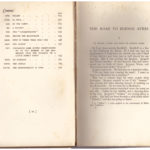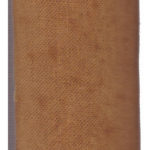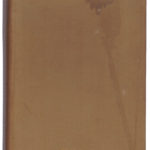Price and stock to confirm
Ed. Constable & Co., 1928. Hard cover. Size 21 x 13,5 cm. State: Used, very good. 200 pages
But this book…And just now when South America, and particularly the Argentine Union, is definitely emerging from the mists of pioneering into the clear light of industrialism. In so far as my rather tenuous general reading goes, it is the first passing commentary on South America, and especially the Argentine, which has the force, value and charm of intimate regional literature. True, there are books of travle relating to South America and the Argentine, and some novels, no one of which I know save through reviews. But unless all reviewers are liars, there has not yet appeared any particular book, lel alone any general body of literature, which picture the life and manners of that steadily emerging continent.
But here now is at least something. A sidelight if you will -but what a sidelight! Read only of the passion of Argentinians for electricity, their standardised streets and houses; the sharply delimited length and breadth of Buenos Ayres between plain and water; the distances between cities and their cultural lacks (true, as measured by White Slavery) -but still lacks. One sees greats advertisements these days in newspapers and trains of methods of reaching the Argentine or Brazil or Chile, but no least
intimation of the nature of the life. In this book, however, -and how odd in connection with this reputedly leprous subject- one comes upon fascinating glimpses of it. «He said she would not do for Buenos Ayres, but on the other hand would do very well for Santa Fe». And since you know what she was like you somehow sense Santa Fe. Similarly, Mendoza and Rosario -places which you know are hundreds of miles apart: «How charming it is to come across a bit of one’s own country so far from home! Everyone spoke French. The landlady was from Montmartre. And the landlord would have given all Rosario to be able to take an apéritif that evening at Cyrano’s». So one picks up bits; the streets, the houses, the active temperaments of the Argentinas, their almost complete preoccupation with business.
Yet in New York, when this small volume came with the request from my friend Kyllmann of Constable and Company that I write a foreword to it, there was an American writer and world reader who saw it in a far different light than I do now. I was not able to read the book at once. But he, sensing the subject from a page or two, I presume, had got as far as page sixteen. There he became loud in his condemnation, «Raw stuff, I would say. I would not lend my name to it if I were you». He had glanced at the letter which was lying in it. «It can’t do you any good. I would let it alone».
I questioned him and half decided that he might be right. Yet later, after reading and meditating upon it, I decide that it had «done me good», very much good indeed, -like «Typee» did me good, like «Tartuffe» did me good, like «Candide» did me good. In fact, I am now quite sure that I shall never quite get over it; so humanely illuminating is it- never quite forget its details or colour or romance even. For it cleared for me (and how cleverly and artistically!) a scene that hitherto had been quite dark, involved as it has been with so much human prejudice and mistaken or wholly false mental approaches.
 The informed, dispassionate, critical and yet sympathetic and understanding mood and manner in which the whole matter is approached. The pains taken in France, Poland and the Argentine to ferret out the sources of and the reasons for this amazing traffic. Not Fabre himself, travelling here and there after his spiders, caterpillars and flies, has laboured more diligently, inspected more closely or reported more artfully or delightfully. Read only if you will the picture of the «Casa Francesca». Or the dinner at the home of «The Bear». Or the incident of the Statue of General Alvear in the Avenue Alvear. Or the business of the knife in the office of the Chief of Police of Buenos Ayres and its connection with graft. Indeed this very peculiar work -along with the glacial judgement so necessary to history and fact- possesses a rare and peculiarly Gallic type of raillery which quite takes one by storm, always delicately pointed and always, in this book at least, applied to the downright and blatant wickedness of man -rather to his unescapable weaknesses and lacks. For these, and these only, M. Londres has a warm and even iridescent sympathy which glows and disarms by its very warmth and its exceedingly wise and kindly understanding (see Chapter IX entitled «Franchuchas»).
The informed, dispassionate, critical and yet sympathetic and understanding mood and manner in which the whole matter is approached. The pains taken in France, Poland and the Argentine to ferret out the sources of and the reasons for this amazing traffic. Not Fabre himself, travelling here and there after his spiders, caterpillars and flies, has laboured more diligently, inspected more closely or reported more artfully or delightfully. Read only if you will the picture of the «Casa Francesca». Or the dinner at the home of «The Bear». Or the incident of the Statue of General Alvear in the Avenue Alvear. Or the business of the knife in the office of the Chief of Police of Buenos Ayres and its connection with graft. Indeed this very peculiar work -along with the glacial judgement so necessary to history and fact- possesses a rare and peculiarly Gallic type of raillery which quite takes one by storm, always delicately pointed and always, in this book at least, applied to the downright and blatant wickedness of man -rather to his unescapable weaknesses and lacks. For these, and these only, M. Londres has a warm and even iridescent sympathy which glows and disarms by its very warmth and its exceedingly wise and kindly understanding (see Chapter IX entitled «Franchuchas»).
Personally, I would never trouble to preface such a work as this if all these things that I have said were not true. There are already too many serious examinations of this very irritating subject and still more under way. But this book is different. It really is one of the most artful and graceful blends of travel, observation, philosophy, humour and even romance that I have ever encountered. Romance? Yes, romance. Moreover, in this book; and how often is all this achieved in even the most brilliant pictures of the world’s social doings? Furthermore, portraiture of characters and events here takes the form of conversation between one person and another. And, whatever the station or crimes of those talking, the easy tone of good society; for instance, the amazing one between the author and Vacabana, the Moor (Chapter V). And throughout, and as curious as it may seem in connection with this particularly distasteful subject, M. Londres appears to presuppose a refined and even congenial listener -some man or woman whom he does not hesitate to take by the hand and lead into the strange circle of which he is interested to report. And so without diffidence, rather with complete and engaging frankness. More interesting still, nowhere will you find the slightest lapse into vulgarity. Here certainly (if ones takes into consideration the general moral or puritanic approach to this  matter) one is dealing with perhaps the most difficult of social subects -but you will not feel so as you read. Rather it is my feeling that M. Londres, along with setting forth a fair, intelligent and really complete summary of White Slavery and its causes and conclusions, has given us literature- and literature which one can place among the best which one has encountered.
matter) one is dealing with perhaps the most difficult of social subects -but you will not feel so as you read. Rather it is my feeling that M. Londres, along with setting forth a fair, intelligent and really complete summary of White Slavery and its causes and conclusions, has given us literature- and literature which one can place among the best which one has encountered.
And now as to the author himself. I am told that he is a regular correspondent on the staff of one of the big Paris daily papers, Le Petit Parisiene, if I am not mistaken. That his present literary duties are to write of various scandals, and that therefore in literary ranks he is not a particularly eminent person. Also that he has written four or five books of no particular import. None the less -and whatever his literary history (more particularly if what I have said is true), in this book he gives the impression of having excelled himself -maybe without quite knowing it. I do not know. But if so he is likely to find himself called upon to exercise his very delicate and resourceful literary skill upon subjects different from those which now employ his daily Paris hours. And I for one most sincerely and earnestly hope so.
CONTENTS
I- In which I find the road to Buenos Ayres
II- Passengers for Bilbao
III- Arrival
IV- In search of the men of the centre
V- To Vacabana, alias The Moor
VI- Victor The Conqueror begins his story
VII- Victor The Conqueror continues his tale
VIII- Victor The Conqueror finishes his story
IX- Franchuchas
X- The principality of the outlaws
XI- Moune
XII- Casa Francesa
XIII- The profession of pimp
XIV- What the women think of the men
XV- In which I play a very dubious part while attempting to play the apostle
XVI- In which the police fish in troubled waters
XVII- Polaks
XVIII- La Boca
XIX- In the campo
XX- A victory
XXI- Two «underweights»
XXII- Before the magistrate
XXIII- Even if there were only one
XXIV- The Parson
XXV- Containing some bitter observations by an old member of the profession upon the occasion of a little family party
XXVI- An Interior
XXVII- The Créolo
XXVIII- The responsability is ours

